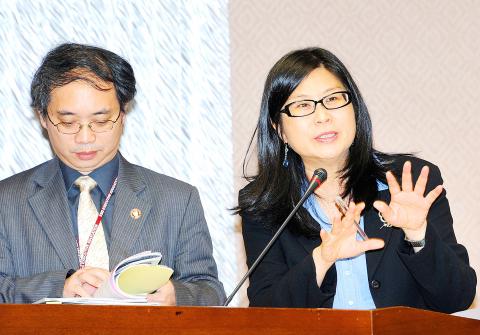Growing Chinese influence on the Taiwanese media, in particular via embedded marketing, is a concern and the government has not done enough to address the matter, Democratic Progressive Party lawmakers said in the legislature yesterday.
At the meeting of the legislature’s Internal Administration Committee, lawmakers accused Mainland Affairs Council (MAC) Minister Lai Shin-yuan (賴幸媛) of doing nothing about embedded marketing by China’s Fujian Provincial Government in local newspapers.
The Chinese-language China Times, a subsidiary of Want Want Group, was reportedly paid to cover Fujian Province Governor Su Shulin’s (蘇樹林) visit to Taiwan last month.

Photo: Fang Pin-chao, Taipei Times
Taiwanese law prohibits Chinese advertising in the media and Chinese investment in local media.
In the question-and-answer session, Lai said an investigation had shown there was “clear evidence” that the newspaper was involved in illegal advertising.
However, the Ministry of Economic Affairs is the agency with the authority over the violations, because Su was invited by the Chinese National Federation of Industries and the ministry has demanded an explanation from the newspaper, she said.
Lai said there was no law in -Taiwan regulating the content of print media because the Publication Act was abolished in 1999, leaving only self-regulation by the media because the Taiwanese government respects freedom of speech and freedom of the press.
DPP Legislator Chen Chi-mai (陳其邁) also cited media reports claiming that state-funded Central News Agency (CNA) had published travel information about Fujian Province on its Web site, which Lai confirmed was against the law.
Lai said Taiwanese media were barred from publishing advertisements provided by unauthorized Chinese advertisers.
Such violations could be traced as far back as 2008, DPP -Legislator Yu Mei-nu (尤美女) said, -adding that the Control Yuan had said in a report that the China Times and the Chinese-language United Daily News were both involved in similar violations in their news coverage on China’s Hunan Province in 2010.
DPP Legislator Chen Ou-po (陳歐珀) said officials from the Taiwan Affairs Office were also suspected of paying personnel in Taiwanese media, citing the case of Feng Fu-hua (馮復華), daughter of former New party legislator Feng Hu-hsiang (馮滬祥).
There has been no coordination among government agencies on the issue, lawmakers said, with the MAC saying it has neither the power to regulate the media nor to determine if visiting Chinese officials violate laws, such as promoting investment in China.
In Su’s case, the ministry was the responsible agency, while in the case of Association for Relations Across the Taiwan Straits (ARATS) Deputy Chairman Zheng Lizhong (鄭立中), who visited southern Taiwan for two weeks in February, the responsible agency was the Council of Agriculture, Lai said.
DPP lawmakers accused the MAC of shirking its responsibilities as the main China policymaking agency over its inability to tackle the issue.
The committee reached a resolution that demanded the MAC coordinate an inter-agency investigation on the matter and levy punishment, if any violation is found, within a month.

A preclearance service to facilitate entry for people traveling to select airports in Japan would be available from Thursday next week to Feb. 25 at Taiwan Taoyuan International Airport, Taoyuan International Airport Corp (TIAC) said on Tuesday. The service was first made available to Taiwanese travelers throughout the winter vacation of 2024 and during the Lunar New Year holiday. In addition to flights to the Japanese cities of Hakodate, Asahikawa, Akita, Sendai, Niigata, Okayama, Takamatsu, Kumamoto and Kagoshima, the service would be available to travelers to Kobe and Oita. The service can be accessed by passengers of 15 flight routes operated by

Alain Robert, known as the "French Spider-Man," praised Alex Honnold as exceptionally well-prepared after the US climber completed a free solo ascent of Taipei 101 yesterday. Robert said Honnold's ascent of the 508m-tall skyscraper in just more than one-and-a-half hours without using safety ropes or equipment was a remarkable achievement. "This is my life," he said in an interview conducted in French, adding that he liked the feeling of being "on the edge of danger." The 63-year-old Frenchman climbed Taipei 101 using ropes in December 2004, taking about four hours to reach the top. On a one-to-10 scale of difficulty, Robert said Taipei 101

MORE FALL: An investigation into one of Xi’s key cronies, part of a broader ‘anti-corruption’ drive, indicates that he might have a deep distrust in the military, an expert said China’s latest military purge underscores systemic risks in its shift from collective leadership to sole rule under Chinese President Xi Jinping (習近平), and could disrupt its chain of command and military capabilities, a national security official said yesterday. If decisionmaking within the Chinese Communist Party has become “irrational” under one-man rule, the Taiwan Strait and the regional situation must be approached with extreme caution, given unforeseen risks, they added. The anonymous official made the remarks as China’s Central Military Commission Vice Chairman Zhang Youxia (張又俠) and Joint Staff Department Chief of Staff Liu Zhenli (劉振立) were reportedly being investigated for suspected “serious

Taiwanese and US defense groups are collaborating to introduce deployable, semi-autonomous manufacturing systems for drones and components in a boost to the nation’s supply chain resilience. Taiwan’s G-Tech Optroelectronics Corp subsidiary GTOC and the US’ Aerkomm Inc on Friday announced an agreement with fellow US-based Firestorm Lab to adopt the latter’s xCell, a technology featuring 3D printers fitted in 6.1m container units. The systems enable aerial platforms and parts to be produced in high volumes from dispersed nodes capable of rapid redeployment, to minimize the risk of enemy strikes and to meet field requirements, they said. Firestorm chief technology officer Ian Muceus said